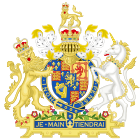Marriage Duty Act 1695
 | |
| Long title | An Act for granting to his Majesty certaine rates and duties upon Marriages Births and Burials and upon Batchelors and Widowers for the terme of Five yeares for carrying on the Warr against France with Vigour. |
|---|---|
| Citation | 6 & 7 Wm. & M., c. 6 |
Status: Repealed | |
The Marriage Duty Act 1695, also known as the Registration Tax, was a 1695 Act of the Parliament of England which imposed a tax on births, marriages, burials, childless widowers, and bachelors over the age of 25.[1] It was primarily used as a revenue raising mechanism for war on France and as a means of ensuring that proper records were kept by Anglican church officials. The tax was found ineffective and abolished by 1706.[2]
See also[]
References[]
- ^ "The Marriage Duty Act: an introduction". www.british-history.ac.uk. Retrieved 2021-03-21.
- ^ Gibson, Jeremy. The Hearth Tax, Other Later Stuart Tax Lists, and the Association Oath Rolls: FFHS, 1996.
External links[]
Categories:
- Acts of the Parliament of England
- 1695 in law
- Marriage, unions and partnerships in England
- 1695 in England
- Marriage law in the United Kingdom
- United Kingdom law stubs